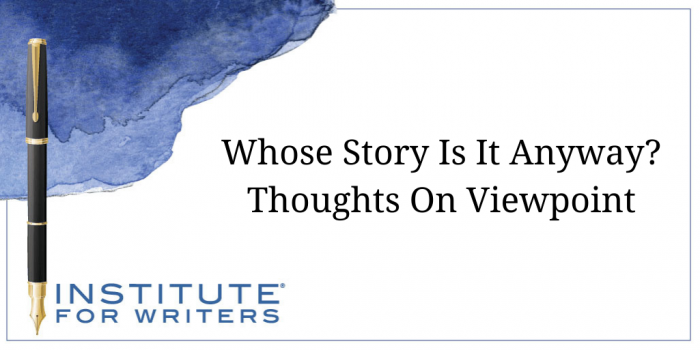1000 N. West Street #1200, Wilmington, DE 19801
© 2024 Direct Learning Systems, Inc. All rights reserved.

When I start a story, I visualize myself in a room full of people. I pace the room. I look at the people and I try to guess the best spot from which to tell the story. It is the first in a long line of tough decisions that make up a great novel, short story, memoir, or essay. Depending where I stand, or which of the people is telling the story, everything could change. At this stage it’s also easy to paint yourself into a storyteller’s corner.
It isn’t unusual to get to a place in a story with one viewpoint and realize that it leaves you wanting. You start telling the story in first person, from the voice of your protagonist. But this only works if you want your reader to know the things that your character can see at the moment that they see them. This can be great for some genres. It can help build suspense. You are literally putting the reader in your character’s shoes, seeing everything, thinking everything, and feeling everything as they do. It can be exciting but can also box you in. If you want to show something that’s happening outside of the line of sight of the character who is telling the story, you break the promise you made.
In Jodi Picoult’s novels she switches viewpoints several times in the story, but she makes the break at the beginning of the chapter. She telegraphs to you that she is making a switch, and she takes you by the hand to say, “come on, let me show you this now.” Readers accept this, but if you just switch direction it gets complicated. You need to give these breadcrumbs.
Sometimes you simply have to start telling the story, and see how far you get. Is it a waste of time, if you get it wrong? No. It gives you more information and knowledge. There is no shortcut to telling a good story. Just write through it. Try it on. It might not fit in the way you want. By writing and experimenting with viewpoint, you will have a better insight into the layers of your stories and the emotion of your characters.
Also consider the complications of gender, age, race, religion, or disabilities. There are perspectives and insights that you can get from a female character that you may not get from a male character. Telling the story from the standpoint of a husband may not be the same as the viewpoint of a wife, even though the thing they are experiencing is the same. A veteran who has lost her legs, may see the everyday tasks differently than the woman who has not. A mother of a baby is going to react differently to a carjacking than a man with a pit bull. Does this mean that you as the writer must stick to what you know? Absolutely not. Read the work of Chris Palahniuk. He is a writer who’s not afraid to take a risk. He writes across gender, and life experiences like a master. As does Wally Lamb, a writing superhero, because he knows how to give you the viewpoint of a female character as well as his male characters. You believe him, even though you know he is stretching the boundaries.
But there is more to it. You can tell a story about someone named Lisa without writing a first person account. As the author you can tell Lisa’s story through the eyes of the other characters, and what they know about her. How does she move through the world? Whose story is entwined with Lisa’s story. Who is following her? Why?
Finding the best storyteller, zeroing in on the viewpoint, and getting to the right way to the story is as difficult as deciding what the story is really is about. It is the heavy lifting. If you do it right, it is the work of building a strong foundation for your story. The main thing is to make the decision on what works for you. And then if you need to, change it.
It’s your story to tell.
Andrea King Collier is an award-winning journalist and author. She writes for leading print, online and broadcast outlets. She is the author of The Black Woman’s Guide to Black Men’s Health, and Still With Me… A Daughter’s Journey of Love and Loss. She is also an in-demand writing teacher and coach.
1000 N. West Street #1200, Wilmington, DE 19801
© 2024 Direct Learning Systems, Inc. All rights reserved.
1000 N. West Street #1200, Wilmington, DE 19801
© 2024 Direct Learning Systems, Inc. All rights reserved.
1000 N. West Street #1200, Wilmington, DE 19801
© 2024 Direct Learning Systems, Inc. All rights reserved.
1000 N. West Street #1200, Wilmington, DE 19801
© 2025 Direct Learning Systems, Inc. All rights reserved.
1000 N. West Street #1200, Wilmington, DE 19801
©2025 Direct Learning Systems, Inc. All rights reserved. Privacy Policy.
1 Comment